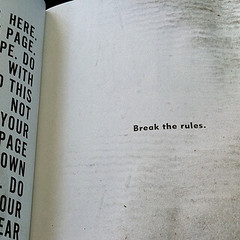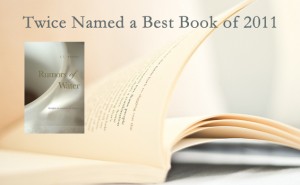The best in poetry (and poetic things), this week with Seth Haines.
1 Art
Is nothing left sacred?
Evidently an elderly townswoman in Spain failed to ask this question before attempting to “touch up” a nineteenth century fresco of Christ, the “ecce homo.” Painted by famous Spanish artist Elias Garcia Martinez in the sanctuary of the local church, the ecce homo was a chipped, yet stunning representation of Christ’s passion. Thinking the fresco in need of a bit of attention, 81-year-old Cecilia Jimenez of Borja, Spain sought permission from the local priest to make repairs. She claims to have received it. The priest says otherwise.
Swearing matches aside, the retouched work has caused quite the stir among art lovers. And is it any wonder? Although I have not yet confirmed it with independent sources, I suspect that the Jimenez’ Christ restoration was actually inspired by the likeness of an X-files mutant. (The fun I have with embedded linking is incomparable).
2 News
Yes, the “truth is out there.” Maybe that’s what led NASA and astronaut Neil Armstrong to take that “giant leap for mankind” on July 21, 1969. Sadly, Armstrong passed away this week, entering the true “final frontier.” Inspired by the life of Armstrong, poet David Cavanagh wrote “Neil Armstrong Shoots the Moon.” It’s a lovely piece, one worth listening to several times over.
On a less serious (but equally stellar) note, singer Will.i.am penned his own space jam, “Reach for the Stars.” The song instantly rocketed to new musical heights–literally. Beamed from the Mars rover Curiosity on Tuesday, “Reach for the Stars” is the de facto number 1 single at all the Martian dance clubs. You can read more about this red-hot single in this piece by the Los Angeles Times, L.A. Now blog.
3 Publishing
Are you a struggling author in need of more press? Then you’ve come to the right place. Last week, Will Willingham highlighted the perfect way to increase your social media reach–buy more Twitter followers! This weeks modest proposal: buy your readers!
In his piece “Buying Book Reviews–Still Admire John Locke?” Porter Anderson reports on a growing trend among aspiring authors. Of the practice, Anderson writes:
“The ‘democratizing’ of content on the Internet, as it’s touted by some, suddenly looks less attractive when users realize they’re the victims of ruthless, orchestrated, profiteering liars.”
A scathing sentence by Anderson, and perhaps one of my favorites of the week. Visit Extra Ether for more a more in-depth look at this shady practice.
4 Business
In 1939, traditional publishers were at the end of their ropes. In the midst of a depression, a global war, and soaring household expenses, discretionary income was limited. (Sound familiar?) As stated by Andrew Shaffer at mental_floss, “books were an impossible expense.” What saved the book industry? Read more about “pocket books” in Shaffer’s “How Paperbacks Transformed the Way Americans Read.”
The way Americans read continues to evolve with the advent of eBooks. This week Amazon.com announced that Suzanne Collin’s Hunger Games trilogy had ousted J.K. Rowlings’ Harry Potter series’ sales records. The difference? eBook sales. In her article, “eBook sales the key in Harry Potter vs. ‘Hunger Games’ battle, ” Colette Bancroft explains why Amazon.com sales figures for the two books may be skewed.
5 Creativity
Ezra Pound noted that “literature has been created” by six different classes of persons. This week, Maria Popova posts Pound’s list. Reading, I began to ask myself whether I fit into any discrete category. I found “Ezra Pound’s List of the 6 Types of Writers and 2 Rules for Forming an Opinion” to be a great self-reflection tool.
I might propose that Mr. Pound include a seventh category into his list: “the bearers of perpetual writer’s block.” Every writer has been there, fingers drumming numbly on the keyboard, randomly typing letters that mean nothing (as;dlfkj a;lskdfj), and waiting to seize upon even the most mildly creative idea. Frans Johansson has some advice for you: be random. In “The Rules of Randomness & How you Can Stand Apart, ” Johansson shares thoughts for innovative success. Read and learn how to “make lots of bets–but purposefully.”
6 Write-It
In his Rules for Writers, George Orwell advised “if it is possible to cut a word out, always cut it out.” Ironic since I could cut a word or two from the famous quote. Of course, other writers have lived and died by similar principles. Consider Ernest Hemingway, who once wrote a short story in just six words: “For sale: baby shoes, never worn.”
The six-word writing prompt: challenging, rewarding. Put your hand to it. Compose your own six-word short and submit it to Narrative Magazine’s “6 Word Stories.” Who knows, maybe you’ll compose the next great short masterpiece!
Don’t you wish politicians were as economical with their words? Join the National Constitution Center’s Address America: Your Six-Word Stump Speech and show them how it’s done.
And follow me on Twitter today as I post my own six-word shorts. In fact, post your own six words on twitter and use the hashtag #6wordshort. I’ll follow along!
7 Poems
My wife is an unabashed admirer of Amy Turnsharp. Perhaps you don’t know Turnsharp’s work–her biting, delicate, ambitiously prolific work. She’s been writing a poem every day for the last 241 days, and Tuesday’s poem was stunning. A “punch gut moment, ” as she says. I love #241, but my absolute favorite is #208 (I have memorized it in its entirety).
I also stumbled across this reading of “Yesterday” by W.S. Merwin while perusing the Poetry Foundation’s “Poetry Everywhere” series. It’s tragic and beautiful. Though we normally reserve videos for the “Sound N Motion” category, I’ve embedded Merwin’s reading here as a bit of a bonus.
8 People
I unashamedly used the word “sweet” yesterday when I read that Steven Spielberg would direct that grand method actor, Daniel Day-Lewis, in “Lincoln.” In preparing for the role, I wonder whether Day-Lewis read the likes of William Knox, Thomas Gray, or Oliver Wendell Holmes. “Why?” you ask. Poets.org explains more in “Presidential Picks: Abraham Lincoln’s Favorite Poetry.”
Speaking of Day-Lewis, did you know that his father, Cecil Day-Lewis, once served as the Poet Laureate of the United kingdom? You can read more about Cecil Day-Lewis’ fascinating life at the Poetry Foundation. And when you are finished, browse their nearly endless catalog of poets, articles and more!
9 Education
Want to write better sentences? Start with asking this question: “where do sentences come from?” That’s the advice of Verlyn Klinkenborg, editorial board member for the New York Times. Equal parts philosophical, instructional, and practical, Klinkenborg leads the reader through an exercise of constructing sentences in one’s thoughts. He writes:
“Think of it this way. You almost surely have a voice inside your head. At present, it’s an untrained voice. It natters along quite happily, constructing delayed ripostes and hypothetical conversations. Why not give it something useful to do?”
Further describing his writing process, he states:
“I’m repeatedly asked how I write, what my “process” is. My answer is simple: I think patiently, trying out sentences in my head. That is the root of it.”
I’ve read this article twice now, and I’m sure it will go in my writing archive. I’d love to hear your thoughts on it in the comments.
10 Sound n Motion
A themed hotel in rural Missouri dedicated to English authors (and literary characters, as it were)? I would be doing you a disservice if I did not sign off with this delightful comedic bit. Especially since I live in Arkansas and could conceivably book a romantic evening in the “Sherlock Holmes” room as an anniversary surprise for my wife!
Now, what are your favorite poetic picks this week? Leave them in the comments; we’ll check them out!
Photos by Claire Burge. Used with permission. Post by Seth Haines.
______________________
- Become a Better Writer: Fly Fishing Artist Date - June 6, 2014
- No Cat Poetry for Fierce Dog Lovers - November 22, 2013
- Exploring Poetry: Penning a Ghazal - October 18, 2013











L. L. Barkat says
Seth, delightful. Like a legal discourse, but the part that goes on in the back room.
Made me laugh.
Seth Haines says
That’s a pretty high compliment… the back room conversations are always the most interesting.
Megan Willome says
Loved the John Oliver bit. He has a recurring role on “Community” as the drunken anthropology professor. He’s great!
Seth Haines says
I’ll have to check that out!
John says
Good work, Seth…that particular Merwin poem makes it hard for me to breathe…and Keillor’s voice on the intro, well, that was just icing.
Seth Haines says
I love Sunday afternoons, wait for that velvety voice to grace NPR.
And that poem… yeah… hard to breathe.
Maureen Doallas says
Someone’s not telling the truth about that fresco.
Some really good (and fun) stuff here, Seth. Thank you for pulling it all together.
Seth Haines says
It was fun indeed. Thanks for stopping in here.
davis says
my poetic pick for the week:
There . by George Johnston
One keeps itching to get there. Where? Never mind
where; one gets there at last, and does not come back
again to tell anyone else where
or how, or what it is like there.
One drives internal combustion vehicles
or one walks, or one rockets across the sky.
Restlessness is the ness one goes by.
It infallibly takes one there.
Seth Haines says
Thank you for sharing this.
Will Willingham says
I’m just wondering at what moment in her work Sra. Jimenez realized she had a problem.
And I, for one, am really glad I now understand how the right verb can coax a proper noun into making a sentence. But when my kids ask, I’m still telling them it’s the stork.
Seth Haines says
Storks?!? I just spit milk through my nose.